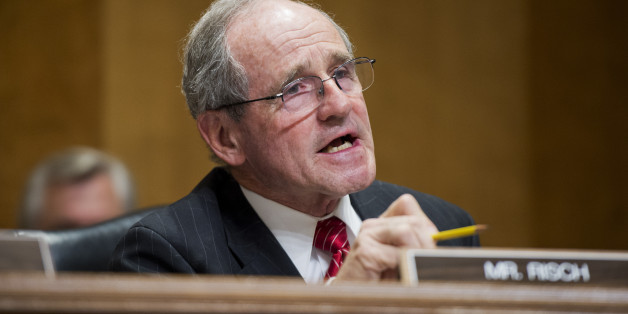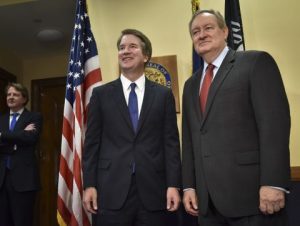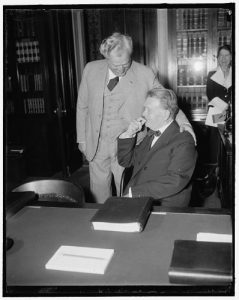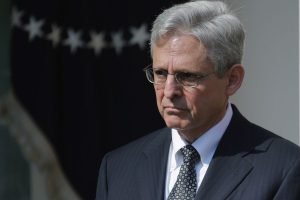When he speaks about big issues Idaho Senator Jim Risch, the new chairman of the Foreign Relations Committee, likes to invoke his experience, the dozens of times he’s been on the ballot, his leadership of the Idaho State Senate and his early years as the Ada County prosecutor. One of Risch’s go-to lines is “I’ve been at this a long time.”
In the increasingly rare interviews Risch grants or when he, also rarely, entertains questions from voters his setup often goes something like this: “I’ve been at this [politics] a long time, I’ve been through 34 elections, I was a prosecutor and [in the context of the Russia investigation] I know what evidence looks like.”
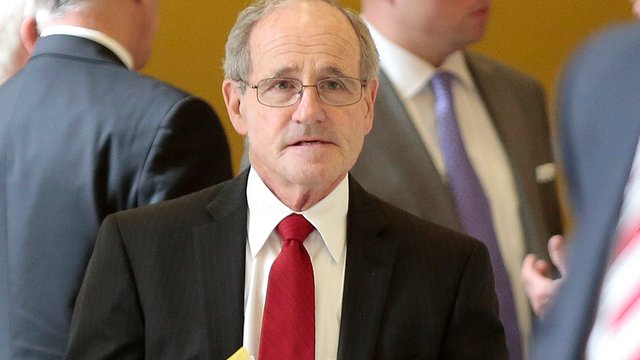
All politicians display a certain level of confidence. It goes with the territory these days. The humble, self-effacing public servant is a relic of American political history, if indeed it has ever existed. But Risch has raised self-assurance to a new level, unlike anything Idaho has seen, well, ever and it’s gotten him into trouble.
Risch’s first real controversy as chairman came over his initial handling of the Senate’s demand for information from the Trump Administration on the murder of Washington Postcolumnist Jamil Khashoggi. When senator’s demanded that the administration follow the law and report on who had ordered Khashoggi’s brutal murder, Secretary of State Mike Pompeo – Risch calls him a close friend – essentially said: “Mind your own business.”
Risch’s initial response was to fully back the Trump line. “We asked for the information. They sent it. And I put out a press release,” Risch told reporters. Then the proverbial organic matter hit the fan. Senate Republicans on Risch’s own committee demanded more and he did schedule a closed hearing earlier this week, but not before apparently misleading fellow Republicans on just how forthcoming the administration had been. All in all it was a stumbling, incoherent performance by a guy who has “been at this a long time.”
You have to wonder why?
Why has Risch worked so hard to shield the president from confronting the murder of a journalist, a murder the nation’s intelligence agencies have placed squarely at the feet of Saudi Crown Prince Mohammed bin Salman? Why are fellow Republicans like Lindsey Graham, Marco Rubio, Chuck Grassley and Mitt Romney confronting the administration over reprehensible Saudi behavior, while Risch has been carrying Trump’s water on both shoulders?
Remember that Trump has said of the Crown Prince, a pal of his son-in-law, that “maybe he did and maybe he didn’t” order the journalist’s murder.
During a contentious recent television interview, recorded while Risch was attending the annual Munich Security Conference in Germany, the senator invoked his “I’ve been at this a long time” certainty with another wrinkle he likes to use – “I know more than you, but because it’s classified I couldn’t possibly comment.”

Asked by veteran journalist Tim Sebastian whether he agreed with Graham’s characterization that there “was zero chance” that bin Salam had not ordered Khashoggi’s murder, Risch spun into a linguistic tap dance, first refusing to answer whether he agreed with the South Carolina senator and then invoking secrecy.
“I’m on the Intelligence Committee,” Risch said, “Lindsey isn’t. I’ve looked at every scrap of evidence there is on [Khashoggi’s murder] and unfortunately because of my position on the Intelligence Committee I can’t sit here and reiterate that for you, and in that regard I can’t comment on that.” Risch then said he could comment on the 17 Saudi nationals sanctioned by the U.S. government, but apparently his opinion about the Crown Prince is classified.
Again the question is why? Does Risch so value his access to the White House that he won’t summon moral outrage at the murder of a journalist whose body was dismembered with a bone saw and has still not been found? Why was he willing to launch his chairmanship by alienating fellow Republicans who must increasingly see him as an apologist for the heinous? Is Risch so concerned about a primary challenge from the far right that there is no “red line” of support for Trump that he will not cross?
In the same period that the senator was covering for the president and the Saudi Crown Prince he was effectively dismissing concerns about Trump campaign involvement with Russia. “It is simply not there,” the former prosecutor explained of his reading of Trump-Russia collusion. That certainty comes even as we now know that Paul Manafort, the convicted former Trump campaign chairman, was meeting with Russian operatives and sharing polling information literally while Trump was securing the GOP nomination in 2016.
In the face of mounting evidence of ongoing Russian efforts to interfere with American elections Risch told the Boise Chamber of Commerce recently “Russia is the most overrated country on the face of the planet. They get so much ink here. They get so much attention here, simply because of Trump, of course. These guys are incredibly inept. They are a nuclear power, there is no question about it. They certainly have some juice, there is no question about it. These guys, they are all bluster.”
Put that comment in context and again ask yourself why?
On July 27, 2016, then-candidate Trump looked straight into television cameras in Florida and said, “Russia, if you’re listening. I hope you’re able to find the 30,000 emails that are missing” — messages Hillary Clinton was said to have deleted from a private email server.
“Actually, Russia was doing more than listening,” as the Associated Press reported last week. “It had been trying to help Republican Trump for months. That very day, hackers working with Russia’s military intelligence tried to break into email accounts associated with Clinton’s personal office. It was just one small part of a sophisticated election interference operation carried out by the Kremlin — and meticulously chronicled by special counsel Robert Mueller.”
And ask yourself why wouldn’t the chairman of the Senate Foreign Relations Committee want to get to the bottom of that and so much more?
—–0—–

